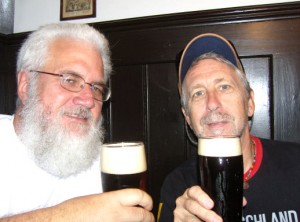The Mt. Angel Oktoberfest, like its older and larger namesake in Munich, is all about celebrating the fruits of the harvest, as well as the wonderful Bavarian heritage we claim as ours.
On a trip to Germany in August, I was reminded of how strong their traditions remain even today, especially in the smaller cities and towns. Some of the proudest traditions in Germany and Bavaria, especially, are those related to the national drink, beer.
Many German towns have breweries, which have often been in existence for centuries, carefully following a brewing recipe that has been handed down for generations.
One place I visited was Bamberg, a city of 80,000 people in the upper Franconian region of northern Bavaria. I had several reasons for wanting to visit Bamberg. A UNESCO world heritage site, it was one of the few medieval towns that was not destroyed or heavily damaged by bombs during World War II.
Bamberg’s old town center, built on and around the Regnitz River, certainly rivals any in Germany with its beauty. And the Cathedral in Bamberg boasts one of the most famous statues in Germany, the Bamberger Rider.
But, to be honest, the main reason I wanted to visit Bamberg was to taste its famous “smoked beer,” or Rauchbier in German. Without question, the perfect place to drink it was in Schlenkerla, the historic brewery tavern where the smoked beer has been brewed for more than 300 years.
I was not disappointed. My German friends and I had a delicious lunch and enjoyed the delicious, dark brown Aecht Shlenkerla Rauchbier (Original Schlenkerla Smoked Beer).
The convivial atmosphere in the old half-timbered building was perfect. Guests sit at long, wooden tables which turns strangers into friends rather quickly. The low ceiling is filled with huge, dark beams that were historically painted with ox blood for protection.
Schlenkerla is a difficult word to translate. It has its origins in the old German word, Schlenkern, which referred to someone who walked with a crooked gait.
The legend has it that one of the former brewers of centuries past was partially crippled by an accident with a beer barrel and earned the nickname of Schlenkerla with his wobbly style of walking. Eventually, the brewery and the beer became known by the same name.
Over lunch, my friend Peter Hauck from Wurzburg told me the story of the Bayerische Reinheitsgebot – the Bavarian Beer Purity Law of 1516.
The law dictated that only three ingredients – water, hops and malt – could be used in Bavarian beer. While the law may have been adopted as much as a means of additional taxation as it was for regulating quality, it still had the effect of creating a standard of purity for German beer that has lasted for nearly five centuries.
The Bavarian law became a law for beeer brewing for all of Germany in 1906.
The Schlenkerla Smoked Beer has the same three ingredients, of course, but the difference is in the malting process. The malt, which is germinated barley, is dried and smoked by burning special beechwood logs underneath a wire netting. The smoke from the fire gives the beer its unique flavor. In contrast, regular malt is dried by heat but not smoked.
While you won’t find any Rauchbier at the Mt. Angel Oktoberfest – it is hard but not impossible to come by outside of Germany – you will find plenty of other great German beers, including beers from Munich breweries like Spaten, Paulaner and Franziskaner.
I asked Dave Marliave, master brewer with Oregon Trail Brewery in Corvallis, to recommend a few of the German beers being served at Mt. Angel Oktoberfest for sampling.
He suggested trying the Spaten Optimator – “a really nice doppel bock with a rich, carmelly flavor . . . it is representative of the physical brewing process used in Germany which creates a unique flavor and texture of beer.”
Marliave was also very enthusiastic about the Franziskaner Weissbier – “a very cool wheat beer – it’s creamy, light and refreshing with a banana-clove aroma.”
Mt. Angel Oktoberfest will also offer Widmer Hefeweizen and Okto in the Biergarten and Weingarten, as well as “selected microbrews” in the Alpinegarten.
If they wish, beer lovers can do a taste comparison of the more traditional German brews along with the innovative microbrews from the U.S.
Marliave says he loves the meticulous, traditional brewing process used in Germany because it gives these beers such a distinctive flavor, texture and color.
But he also believes the incredible variety and character of the microbrews now being produced also has tremendous value, and is even influencing the younger generation brewers in more traditional places like Germany to begin experimenting more.
“We have taken hops (in the brewing process) to an absolutely insane new level . . . we have an ability to copy everyone else and then bastardize it and make it great. Honestly, we’ve taken a lot of styles and done what traditionalists would consider ruining those beers. But out of that we’ve had these just really outrageous styles emerge. I mean Americans more than anything have defined outrageous beers . . . aging beers in wood for years, (making) Belgian-style or German-style beers hopped like IPAs . . . just our ability to incorporate, adapt and make old styles (into something) originally American.”
Maybe that ability to “incorporate, adapt and make old styles new” is really what makes the Mt. Angel Oktoberfest so outrageously fun, as well. Traditional Bavarian, but with a little in-your-face Americana added to it.
Enjoy!
